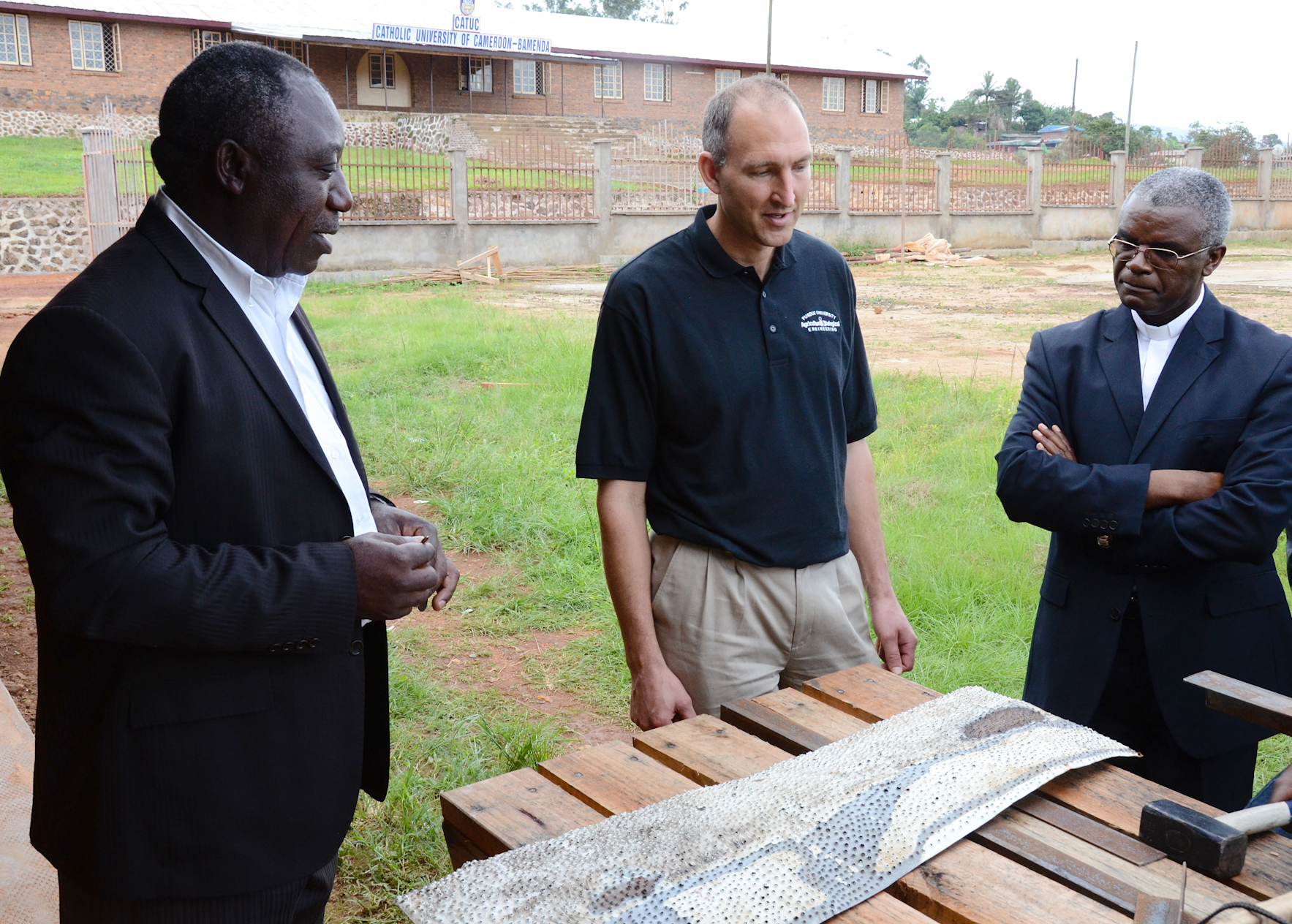Purdue students will visit Cameroon to build basic utility vehicle

John Lumkes, at center, a Purdue professor of agriculture and biological engineering, talks with members of The African Centre for Renewable Energy and Sustainable Technologies during a past trip to Bangang, Cameroon. For the third consecutive year, Purdue will send a group of students and advisers to Cameroon in May to work on creating a basic utility vehicle that is affordable and practical for residents of the area. (Photo contributed)
WEST LAFAYETTE, Ind. - A group of six Purdue University students will travel to Cameroon this month as part of ongoing efforts to provide affordable and practical transportation to the underdeveloped area.
Purdue's Department of Agricultural and Biological Engineering partnered with The African Centre for Renewable Energy and Sustainable Technologies (ACREST) in 2009 to develop a basic utility vehicle (BUV) that is low-cost, durable, adaptable and easily manufactured. Students from other disciplines of engineering and the colleges of Agriculture and Technology also have contributed to the project.
On Monday (May 7), the Purdue team will travel to Bangang, Cameroon, to produce a three-wheel BUV based on designs developed over the current academic year.
The prototype has been tested through 3-D modeling software and extensive field runs and is modified from previous BUV models the Purdue team used in Cameroon. Purdue's team also won the 2012 Institute for Affordable Transportation Student Design Competition, running the vehicle for more than 10 hours and 60 miles while carrying 110 gallons of water and two people.
"Not only are we building a BUV, but we're trying to teach the ACREST staff how to replicate the machine if they have the right materials," said Brian Fleming, a senior studying agricultural and biological engineering. "The vehicle is designed to be built with basic hand tools, saws, drills and a welder. Last year it was hard to cut some of the angles with the tools we had, so this year all of the angles are easy and the dimensions are pretty loose as far as what is required."
The project's goal was to keep costs around $1,500, not including the engine. The changes implemented this year have reduced the cost to $800. Small diesel engines are available locally in Cameroon for $500.
"It's not only significantly cheaper, but it's also easier to build," said John Lumkes, a professor of agricultural and biological engineering and the team's technical adviser.
Purdue's first BUV designed for Cameroon was constructed mostly of wood. The new model features more angle iron and car driveline parts that can be recycled from a junkyard. Other notable changes include adding a front strut to allow for braking on all three wheels, front suspension and a 5-speed transmission with reverse.
This year's prototype is similar to a car driveline, whereas last year's BUV featured a transmission composed of belts and pulleys, which was difficult to replicate in Cameroon.
Rural roads in the area are mostly dirt. They are narrow and many have ruts nearly a foot deep. The BUV would allow villagers to transport large amounts of water and goods over the rough terrain.
"If you've ever been in a bean or corn field and you're going against the rows at 20 or 30 miles per hour in a pickup truck, it's something like that," Fleming said.
The BUV can reach a top speed of 25 miles per hour and carry 2,000 pounds. Lumkes said the vehicle's top speed isn't as important as the vehicle's ability to slowly climb hills with materials loaded in the cargo area.
"We design it to go over any terrain we think they might see," Fleming said.
Purdue's BUV prototype may soon lead to some level of mass production.
"It's a future goal once we get to a vehicle they want, and we think this vehicle is getting close to that," Fleming said. "Once we get to that point, we want to be able to set up a business plan and a micro factory so they can replicate the vehicles in bulk, which will allow them to make the vehicles more affordable."
Students traveling to Cameroon as part of the BUV project include Tyler Brammeier (mechanical engineering), Lucas Dull (agricultural and biological engineering), Fleming, Jacqueline Fontaine (mechanical engineering), Chester Magiera (agriculture systems management), and David Wilson (agricultural and biological engineering). Not traveling to Cameroon, but participating in the project, are Tyler Anselm, Carolyn Creighton, Jordan Garrity, Ian Geis, Harrison Honerkamp, Scott Kreeger and Josiah Thomas.
Other Purdue students will travel to Cameroon this month to continue work on a small hydropower system that provides electricity for vital services, homes and schools.
Writer: Brian Peloza, 765-494-2081, bpeloza@purdue.edu
Sources: John Lumkes, 765-494-1173, lumkes@purdue.edu
Brian Fleming, bfleming@purdue.edu
VIDEO:
Purdue competes in 2012 Institute for Affordable Transportation Student Design Competition
